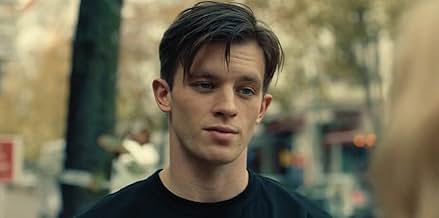Una giovane donna viene indotta con l'inganno a unirsi a un movimento giovanile europeo, con l'obiettivo di prendere il potere. A sua insaputa, è il gruppo che ha ucciso quasi tutta la sua f... Leggi tuttoUna giovane donna viene indotta con l'inganno a unirsi a un movimento giovanile europeo, con l'obiettivo di prendere il potere. A sua insaputa, è il gruppo che ha ucciso quasi tutta la sua famiglia in un'esplosione terroristica.Una giovane donna viene indotta con l'inganno a unirsi a un movimento giovanile europeo, con l'obiettivo di prendere il potere. A sua insaputa, è il gruppo che ha ucciso quasi tutta la sua famiglia in un'esplosione terroristica.
- Premi
- 1 vittoria e 6 candidature totali
Recensioni in evidenza
Radicalisation of any kind starts with either desperation or charm. The film builds this up slowly and sensitively, with a youth scene which is attractive and seemingly advocating a "new" right movement. This part was well handled and explained. The ending seemed glib, rushed and unbelievable. The actors were charismatic and deserve credit.
Christian Schwochow's film is a disturbingly topical dystopia, an incursion into the renewed modes and operations of the new neo-fascist youth movements in Europe and which find their replicas in other parts of the world, such as the so-called "libertarians" of Argentina. For instance. A pan-European phenomenon with TED conventions and progressive clothes and manners that will reveal, with the excuse of insecurity, his white supremacist motivations against immigrants and his vocation for power. And that raises a question: how solid do our principles stand when we become victims?
Review
After suffering a family loss, Maxi, a young student (Luna Wedler) is seduced by Karl, a young far-right activist (Jannis Niewöhnner) and introduced into a European neo-fascist youth movement.
Maxi is seduced by the beautiful Karl (a Machiavellian Jannis Niewöhnner, in a character reminiscent of the protagonist of Hater) and invites her to meet Re / Generation, an organization for "change". To what extent will someone who is processing a grief allow themselves to be used? Will it follow the path of the protagonist of the film Hadewijch, by Dumont? What ideological changes can the condition of victim produce? Luna Wedler (the protagonist of the Biohackers series) deals with an ambiguity that makes her character very interesting. The opposite of her is Alex, her father (great performance by Milan Peschel), who has other ways of processing a duel that will distance them.
Beyond some script weaknesses, Christian Schwochow's film is a disturbing foray into the renewed modes and operations of the new neo-fascist youth movements in Europe. It should be noted that the phenomenon is not limited to the Old Continent, since it finds its replica in the so-called "libertarians" of Argentina, for example.
We are far from the world of proletarian neo-fascists sons of German reunification. It is now about organizations (in this case the fictitious Re / Generation; attention with its logo) to which middle class young people adhere, many of them students, who organize conventions with TED talks and new age airs, making intensive use of social networks and who spuriously seize slogans, topics and ways of the progressive left. The mask of false progressivism does not take long to fall and show its true face, its obsession and its fanaticism: a pan-European white supremacism whose target is immigrants and which agitates the issue of "insecurity" and "change"; It is a phenomenon that does not end in watertight nationalisms because "they - immigrants - are everywhere." The film, focused on young people, leaves out of the field the economic interests that move behind and that sustain these movements and groups, very organized and with a vocation for power, and who do not repair the means to achieve it.
Je suis Karl describes a real state of affairs and goes one step further, painting a disturbingly topical dystopia.
Some people might think it shows a way too one-sided perspective, but if you think about it a little it's actually a lot deeper.
The film shows that extremism can come from all sides & can be equally dangerous & dangerous. Instrumentalization goes undetected for too long & not everything you think is really right. Complex thinking is important.
I rated 9/10 stars because the age restriction should be significantly higher in my opinion. Young people could be misinfluenced & misguided if they do not understand the message.
A scared, young survivor of an attack becomes another victim of a radical, extremist group plotting to shift opinion through the savvy use of social media.
For some, the film will be an eye opener about the lengths to which some groups are willing - and able - to go to further their political agendas.
Je Suis Karl is a believable story set in the backdrop of the political polarization found not only in Europe but across many parts of the world.
The movie may move slowly initially but the story picks up pace as the plot unfolds. A worthwhile film for the politically inclined film goer.
Lo sapevi?
- Citazioni
Karl: What matters most to you?
Maxi Baier: Trust. What is the worst thing in the world for you?
Karl: To die for no reason.
Maxi Baier: And the best?
Karl: To die with purpose.
I più visti
- How long is Je Suis Karl?Powered by Alexa
Dettagli
- Data di uscita
- Paesi di origine
- Siti ufficiali
- Lingue
- Celebre anche come
- Tôi là Karl
- Luoghi delle riprese
- Aziende produttrici
- Vedi altri crediti dell’azienda su IMDbPro
- Tempo di esecuzione
- 2h 6min(126 min)
- Colore
- Proporzioni
- 2.35 : 1

![Guarda Trailer [OVS]](https://m.media-amazon.com/images/M/MV5BMTdjMTA1MjYtYmZkMy00MTE0LTk3MGItYjdhM2M3ZjgxYzNlXkEyXkFqcGdeQXRyYW5zY29kZS13b3JrZmxvdw@@._V1_QL75_UX500_CR0)






























